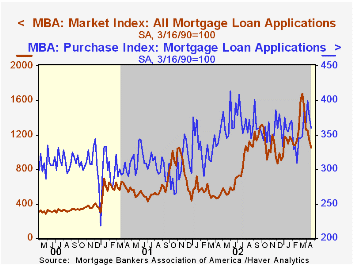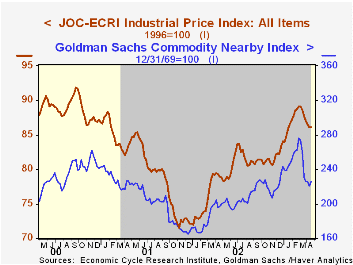 Global| Apr 23 2003
Global| Apr 23 2003Mortgage Applications Down for Fifth Week
by:Tom Moeller
|in:Economy in Brief
Summary
The index of mortgage applications compiled by the Mortgage Bankers Association dropped 6.9% last week. It was the fifth consecutive weekly decline. During that period applications have fallen 36.9%. Last week's decline was due to [...]

The index of mortgage applications compiled by the Mortgage Bankers Association dropped 6.9% last week. It was the fifth consecutive weekly decline. During that period applications have fallen 36.9%.
Last week's decline was due to declines in applications both to refinance and purchase. Refinancing applications fell 8.0% and were down 45.6% during the last five weeks. Nevertheless, applications to refinance were 50.6% higher than last year's average level.
Mortgage applications for home purchase fell 4.3% last week, the third decline in four weeks. Last week's level of purchase applications was 1.5% higher than the average level of last year.
The average size of a mortgage loan application fell again to $177,900 (-3.7% y/y), but the size of purchase applications grew. The average size of an application for home purchase rose to $193,000 (+4.4% y/y). The average size of an application to refinance fell 1.0% to $170,900, off 24.2% from the high set in June of last year.
Interest rates on a conventional 30-Year mortgage fell for the second week as the contract rate fell to 5.67%. That was versus 5.82% averaged in December. The effective rate (incl. points) fell to 5.96%. The effective rate on a 15-year mortgage fell to 5.34%.
Visit the Mortgage Bankers Association site at www.mbaa.org.
| MBA Mortgage Applications (3/16/90=100) | 4/18/03 | 4/11/03 | 2002 | 2001 | 2000 |
|---|---|---|---|---|---|
| Total Market Index | 1,055.8 | 1,134.6 | 799.7 | 625.6 | 322.7 |
| Purchase | 359.9 | 376.1 | 354.7 | 304.9 | 302.7 |
| Refinancing | 5,103.9 | 5,546.7 | 3,388.0 | 2,491.0 | 438.8 |
by Tom Moeller April 23, 2003

The index of commodity prices compiled by the Journal of Commerce (JoC) and the Economic Cycle Research Institute (ECRI) meandered in a tight range since early April. The All Items index ranged between 85.8 and 86.8 for most of this month.
The retreat in crude oil prices stabilized recently with the US spot price for West Texas Intermediate crude rising to about $30.00 during the last few days versus a low of $27.48 earlier in April. That's down from a weekly high near $37.00 in late-February.
Stability in oil prices was matched by stability of other commodity prices. Metals prices recently were about even with the early month level as very recent gains made up for declines early in the month. In fact, the JoC-ECRI index of metals prices was up 5% from last November and that was up 12% from the low in November 2001.
The index of textile prices also recovered recently from earlier declines. Since yearend these prices have risen about 3% and are up about 8% from last year's low.
During the last ten years there has been a 68% correlation between the level of the JoC-ECRI All Items Index and the y/y change in factory sector industrial production.
For more on commodities prices from ECRI click here.
The index of commodity prices compiled by Goldman Sachs also stabilized this month. Earlier declines in this index were larger than the decline in the JoC-ECRI index due to a heavier (66.7%) weighting of petroleum prices. For more information on this commodity price index go to www.gs.com.
| JOC-ECRI Industrial Price Index (1996=100) | 4/22/03 | 12/31/02 | 2002 | 2001 | 2000 |
|---|---|---|---|---|---|
| All Items | 85.9 | 83.9 | 79.6 | 80.4 | 89.0 |
| Textiles | 63.7 | 62.4 | 59.7 | 61.3 | 69.7 |
| Metals | 80.3 | 75.8 | 75.2 | 75.5 | 87.8 |
| Miscellaneous | 90.8 | 90.1 | 85.9 | 87.4 | 86.5 |
| Petroleum Products | 130.0 | 132.5 | 110.2 | 109.0 | 137.6 |
Tom Moeller
AuthorMore in Author Profile »Prior to joining Haver Analytics in 2000, Mr. Moeller worked as the Economist at Chancellor Capital Management from 1985 to 1999. There, he developed comprehensive economic forecasts and interpreted economic data for equity and fixed income portfolio managers. Also at Chancellor, Mr. Moeller worked as an equity analyst and was responsible for researching and rating companies in the economically sensitive automobile and housing industries for investment in Chancellor’s equity portfolio. Prior to joining Chancellor, Mr. Moeller was an Economist at Citibank from 1979 to 1984. He also analyzed pricing behavior in the metals industry for the Council on Wage and Price Stability in Washington, D.C. In 1999, Mr. Moeller received the award for most accurate forecast from the Forecasters' Club of New York. From 1990 to 1992 he was President of the New York Association for Business Economists. Mr. Moeller earned an M.B.A. in Finance from Fordham University, where he graduated in 1987. He holds a Bachelor of Arts in Economics from George Washington University.
More Economy in Brief
 Global| Feb 05 2026
Global| Feb 05 2026Charts of the Week: Balanced Policy, Resilient Data and AI Narratives
by:Andrew Cates






